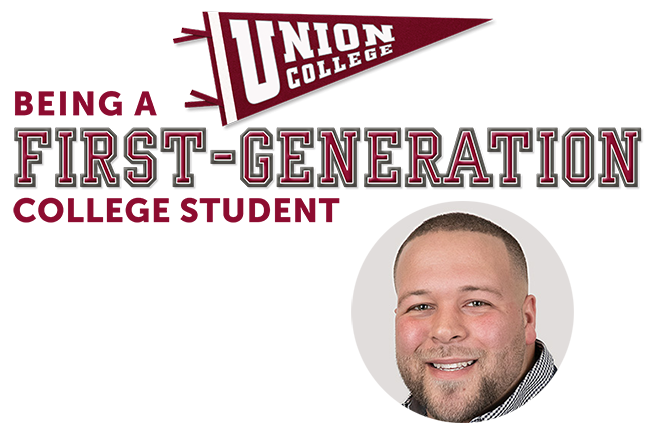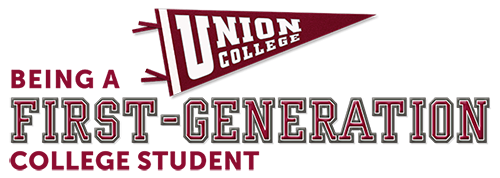Aaron Ray '10 majored in American studies at Union College. His favorite classes included “Civil Rights Movement” with Professor Melinda Lawson, “Mental Health in Society” with Professor Gretchel Hathaway, and astrobiology with Professor Rebecca Koopmann. His favorite Union experiences were hosting a radio sports talk show with four of his closest friends (“Talk Junk Jam”) and participating in the inaugural Civil Rights Mini Term (2009). Originally from Cobleskill, N.Y., he now lives in New Hartford, N.Y., where his is director of Opportunity Programs at Hamilton College.
How did you find Union and why did you choose to attend?
I was actually pretty indifferent about the college search process because my school counselor laughed at me when I said I wanted to be a veterinarian. It wasn’t until I was recruited for football that I even considered Union. When I was recruited, I had the opportunity to do an overnight visit. I enjoyed what I experienced and ended up applying early decision.
Who were your mentors and how important was their guidance?
I had a number of mentors that impacted me at different points in my time at Union. Carolyn Fielder, my AOP counselor, was probably the most consistent voice in my ear. But I wouldn’t have been as successful as I was without Professor Lawson, Professor Aslakson, Professor Hill-Butler, Professor Hathaway, Professor Cox, Timothy Dunn (Greek Life), Scott Felix (swimming & diving/lifeguard supervisor), and Kelli Johnson (AOP).
Students often feel pressure to do well in college. Did you feel any particular pressure?
Initially, my mom told me that if my grades dropped below a 3.0, I would lose financial support from my parents. Fortunately, she didn’t hold me to that. A lot of the pressure came from just being at Union. The level of rigor was something I hadn’t experienced attending a rural public high school. I definitely dealt with imposter syndrome (though at the time I didn’t know what that was). It took a while for me to find my footing, but I did!
Where did you feel most seen on campus? Most invisible?
I felt most seen in AOP. While our space was small, and was shared with Pre-Health Professions, it was home away from home. It was a space I knew I could go to and feel accepted. Other than that, being with my friends. I had a great support network of friends that continue to this day. To be honest, I felt most invisible by administrative leaders. The dean of students at the time was probably the first offender. There were times I would reach out and never received a response. I managed without his support, but talk about feeling insignificant.
Have you provided any mentorship yourself, academically or otherwise?
I pride myself on providing mentorship to students, family members, and other young professionals in my field. I know how important mentorship has been to me and my personal and professional growth. If I can make a similar impact for even one other person, I feel like I have been successful.
What made you click? Where did you find your niche? What experience made you feel like you belonged at Union?
Again, it was my close group of friends. While we had our ups and downs (like most friend groups have), we were always there for each other in times of need. We made space for each other on a campus that didn’t always make space for us. When I look back at photos and videos (one of my many nicknames at Union was ‘Paparazzi’), there is a consistent theme in terms of the people I was photographed with. They take up a lot of space in my external hard drive. Other than that, AOP played a huge role in my experience at Union. I don’t think AOP at Union gets enough credit, but they’re doing some incredible work and making a huge difference in the lives of students who otherwise may not have been able to attend Union. Just recently, an AOP alum was named a Rhodes Scholar and in the write-up about it, AOP wasn’t mentioned. I don’t think AOP gets the credit it deserves!
Do you feel your Union experience differed from that of your peers? If so, how?
As a first-gen student, I feel that my experience was different from probably 80-85% of my peers at Union, which isn’t necessarily a bad thing. But it made for some tough lessons being learned, and maybe I wasn’t able to take full advantage of all that Union had to offer because I just didn’t know about it going in. I also drove a 1988 Plymouth Reliant (K Car) that stood out on campus like a sore thumb. I even had a campus safety officer mock me. I imagine most students at Union had cars that campus safety officers didn’t mock them over. But honestly, I wouldn’t change anything about my experience at Union (except, maybe I would have studied abroad).
Were there any particular programs or people at Union who really made a difference to you, either academically or personally?
There were three. The first, and most important program, was AOP. Having that support network was crucial to my success at Union. While I had the academic chops to make it at Union, I didn’t always have the confidence or best study habits. Having a program like AOP supporting me was incredible, and something I didn’t fully appreciate until after I graduated. The Civil Rights Mini-term, created and led by Professor Melinda Lawson, proved to be a pivotal moment in both my academic career and my life. I wouldn’t be where I am today without that trip. Finally, the track & field team. While I played other sports at Union, the relaxed nature and camaraderie that I found in the track & field team was exactly what I needed, when I needed it. Great coaches, great teammates, and great memories.
I think Union offers a wonderful mix of a world-class education – the ability to combine a wide variety of academic and extracurricular interests, all within a unique location with a very unique academic calendar (shout out to Schenectady and the trimester system!). While I believe mentorship happens organically for many at Union, there are some that miss out. Union cannot be at its best until all are afforded the same opportunities. I’m glad to see some programming has been put in place focused on first-generation students, but would love to see Union take the next step, and really focus on ensuring all students have access to mentorship to help them to get the most out of all that Union has to offer.


